
My experiences at the House of the People
The House of the People, a groundbreaking grassroots initiative, convened its first national democratic assembly in London, bringing together a diverse group of citizens to shape the future of the UK.
I was one of the participants, here is my experiences and insights from this pivotal event, showing a firsthand look into what it’s like to be part of a revolutionary change.
Unexpected Call to Action
My journey began with a surprise: I was selected for the House of the People lottery after having been unsuccessful in a previous round of the sortition lottery.
I had learned about the initiative through a Real Democracy Movement newsletter. I had attended their Assemblies for Democracy in 2015 and was excited about the prospect of real direct democracy, which I believe is “the future”; the next step in the evolution of democracy.
https://realdemocracymovement.org/a-peoples-lottery-with-a-difference
Local Assembly
I had attended a Local Assembly on Climate Change in Huddersfield just over a week previously, initially not realising that it was part of the same movement.
The event was described thus: Feeling powerless about the state of the world? Anxious about the lack of action on the climate & nature crises? A better, fairer world is possible! Help fix our broken democracy! Citizens’ assemblies are a powerful way to improve our broken democratic system. The Kirklees Climate Assembly’s findings and demands will feed into a 3 day assembly in London in July to demonstrate how this could work. Find your voice and connect with others at a climate assembly for Huddersfield & Kirklees.
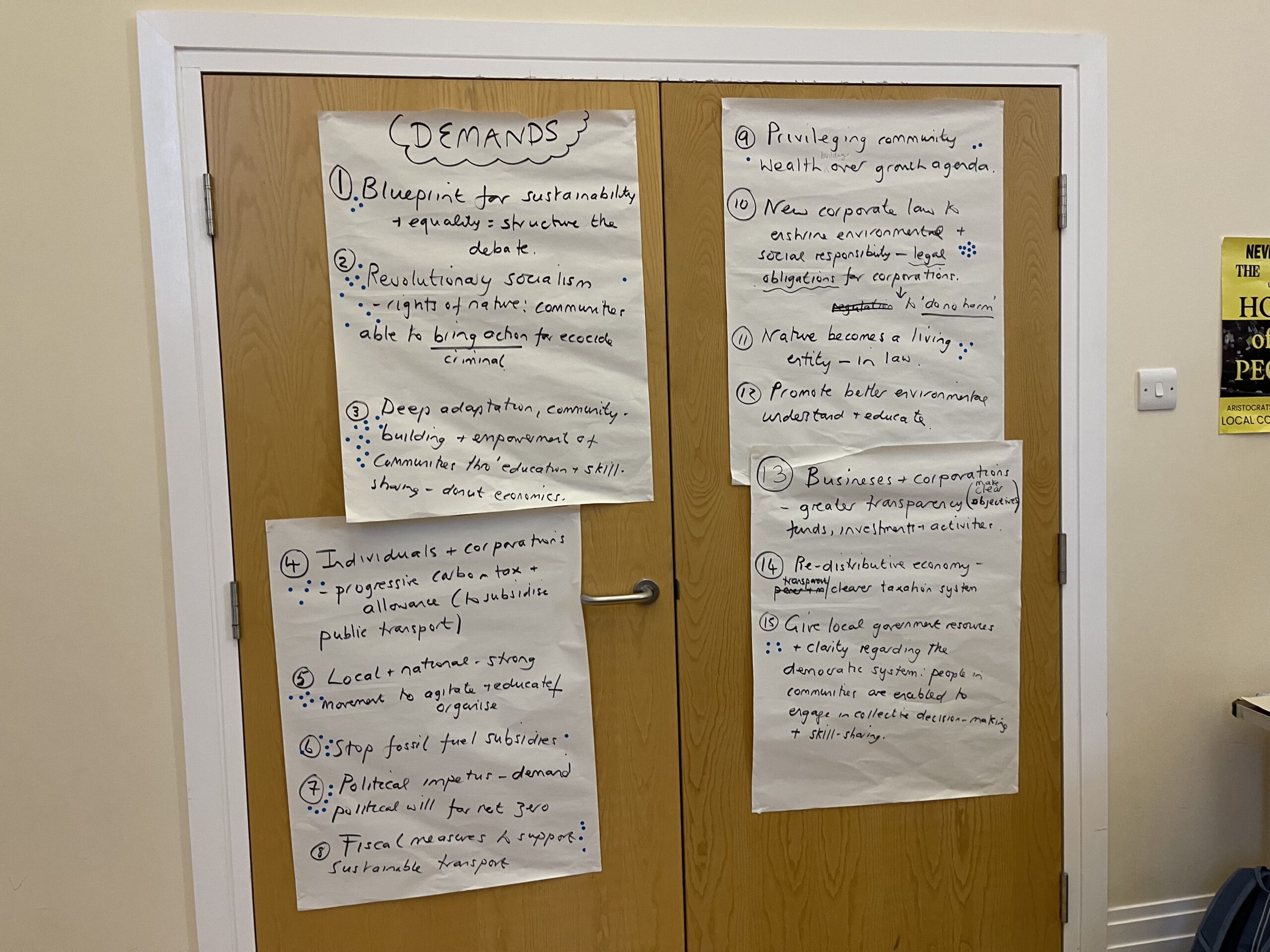
Journey and Gathering
My trip to London for the event involved a multi-leg journey by bus and train, eventually arriving at my accommodation in Camden.
On my first evening, I attended a gathering at Kairos, a community venue, where I found myself in conversation with individuals holding vastly different ideologies.
One objected to King Charles hosting a Moslem event at Windsor Castle as he is head of the Church of England, that seemed to be an ecumenical matter to me and possibly to King Charles. However we both agreed to the abolition of the Monarchy. Another had assumed that those travelling illegally by boat were made illegal asylum seekers by that action, not so. Friendly discussion was had; a taste of things to come.
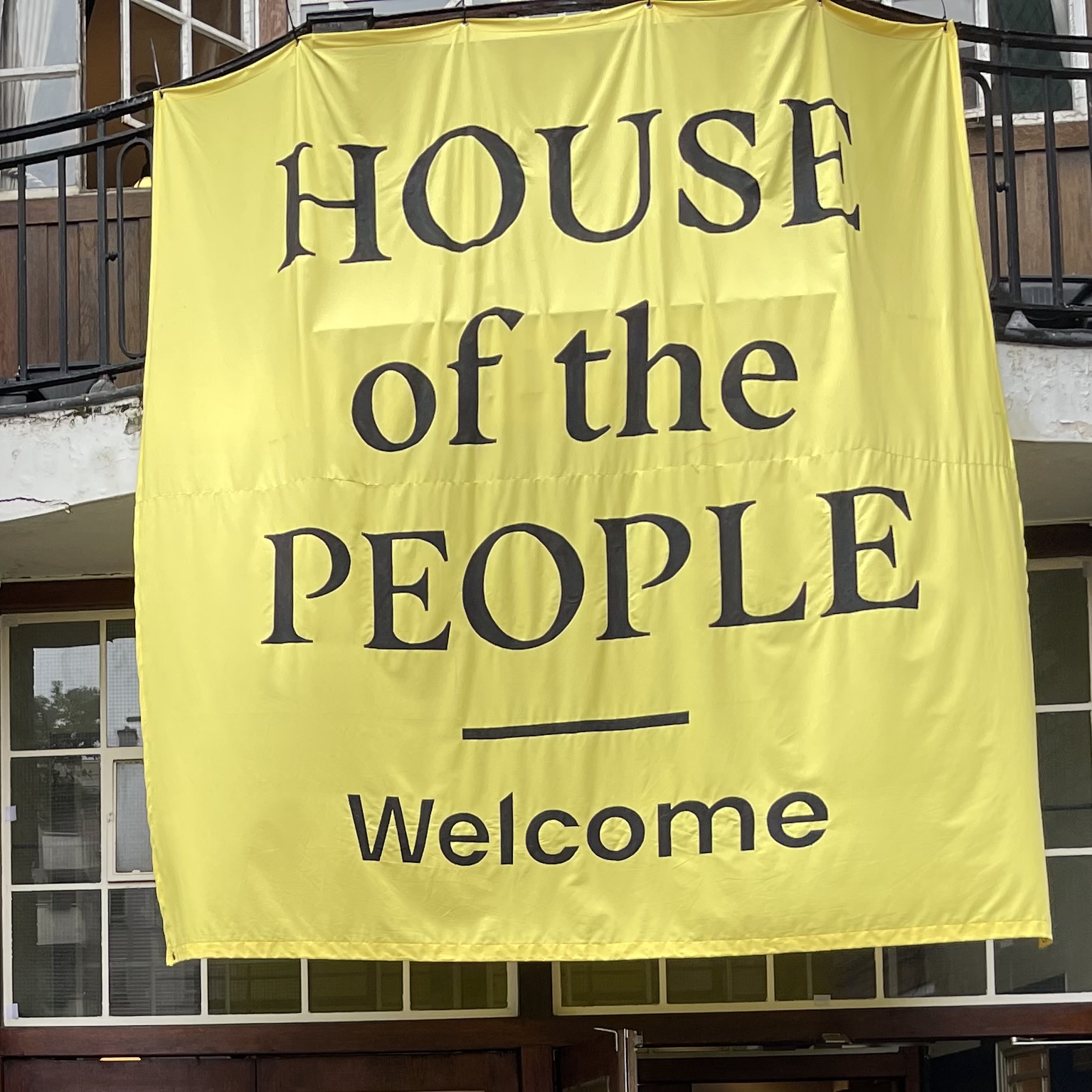
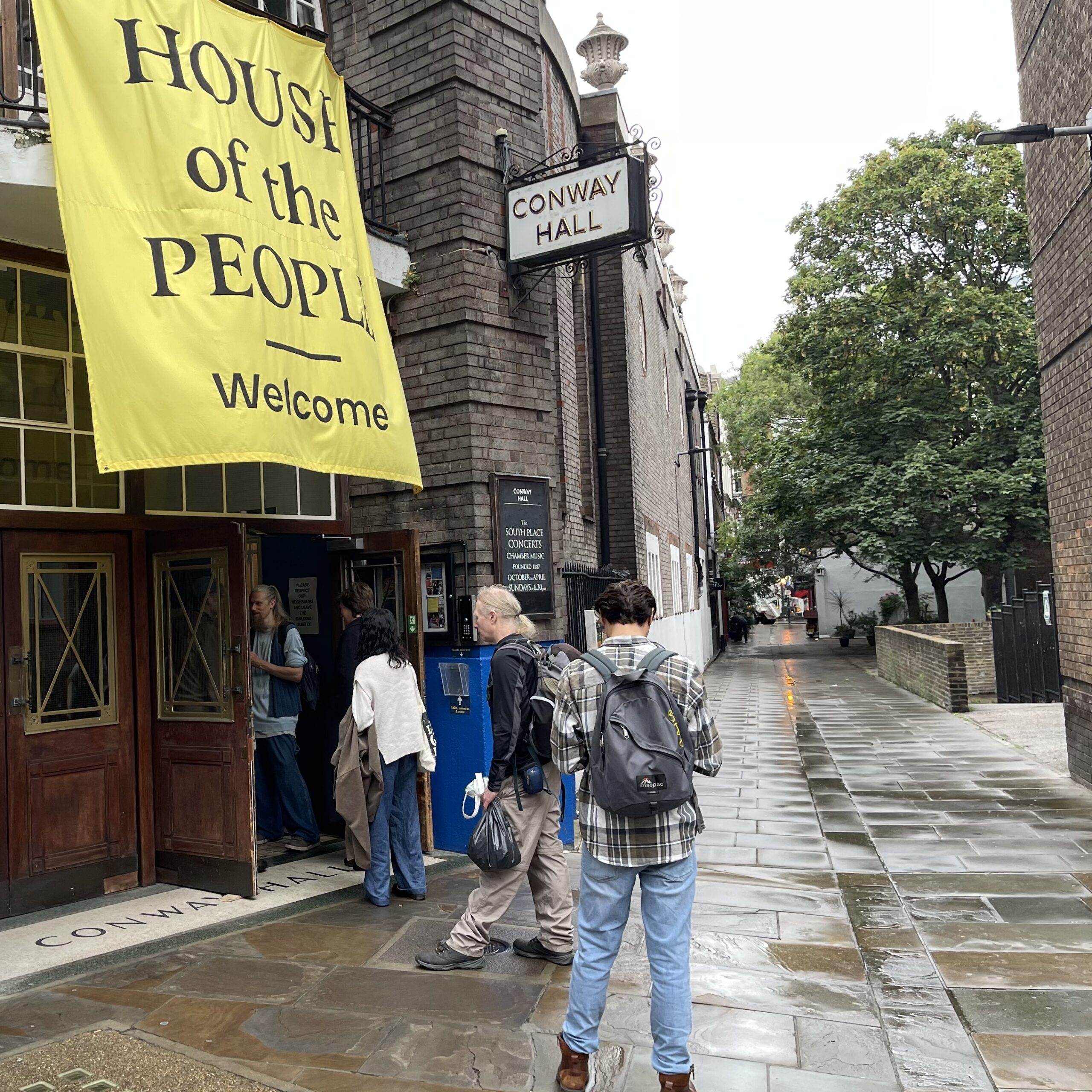
Inside the House of the People: A Collective Endeavour
The House of the People brought together 100 individuals, selected to represent the diversity of the UK public, including some chosen by demographic lottery and some nominated by their community assemblies. Our overarching task was to create a National Charter for political action, a document envisioned to be written by the people, not traditional politicians or lobbyists.
The event took place at a fitting location, Conway House Ethical Society.
Fostering a Safe and Productive Environment
The facilitators at the House of the People emphasized creating a “safe space” where everyone felt respected and comfortable contributing. The discussions were framed as deliberations to reach common ground, not debates aimed at winning. Key guidelines included the following:
Respectful Disagreement
Participants were encouraged to speak from experience and listen to each other respectfully, even when views differed.
Facilitator Neutrality
Facilitators remained neutral, guiding discussions to ensure equal participation and efficiency through tools like hand signals for time management and voting.
Confidentiality and Technology
Discussions were recorded using Dembrane’s Echo, a cutting-edge LLM listening technology, which processed and summarized insights while ensuring confidentiality and anonymity in the final report. Initially I was skeptical of AI summaries, having had some experience of inaccurate outputs. Menti was the software used for voting. This was very user friendly but the process was fairer when the voting was not projected until all votes were cast thus preventing strategic voting, and had a point of contention regarding the emphasis on only the top three priorities in subsequent votes, all or top three should have applied to all for an accurate result.
Collaborative Process
Local Assembly Input – day one
After introductions around the table and a briefing on the House of the People and the general structure of the event some of the tables departed to break out rooms while others remained to discuss what changes we’d like to see and which ideas from the local Assemblies resonated with us.
One of our group made an impassioned speech about getting rid of current land owners and creating a sort of modern commons. It reminded me of the story of the Lord of the Thetford Castle, who wanted the spoils of his Manor for himself so William sent in his militia, had him killed and installed someone else.
Two women in our group session stood out; one was initially unable to speak and the other stated how she was moved by being listened to, it struck me that both were indicators of “Patriarchy”.
I was hoping that Direct Democracy (People’s Assemblies) will be put at the top of the Charter as it’s got the potential to make any other changes we might come up with become reality.
Our Facilitator said she loved my stories, they were magical.
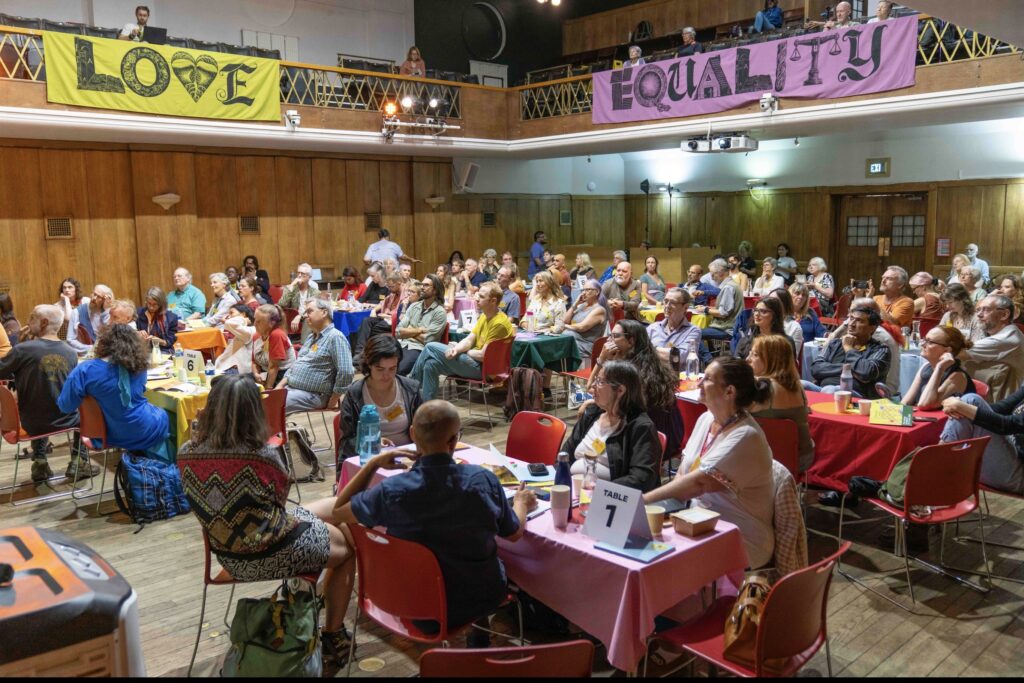
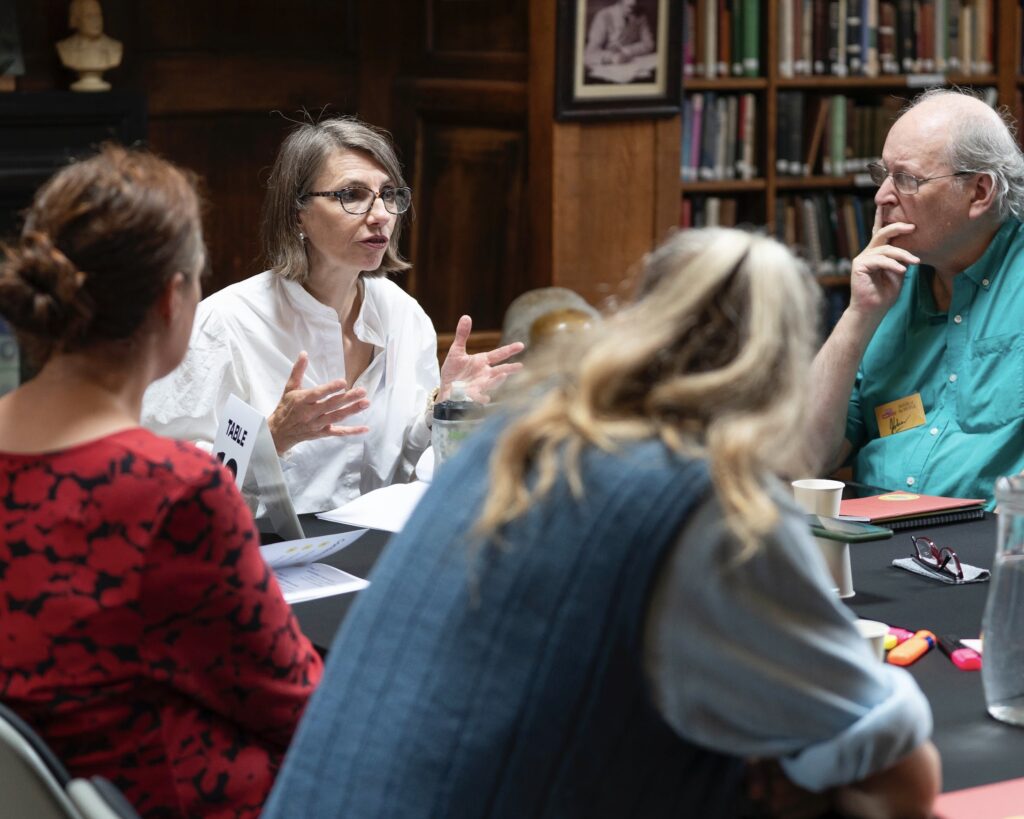
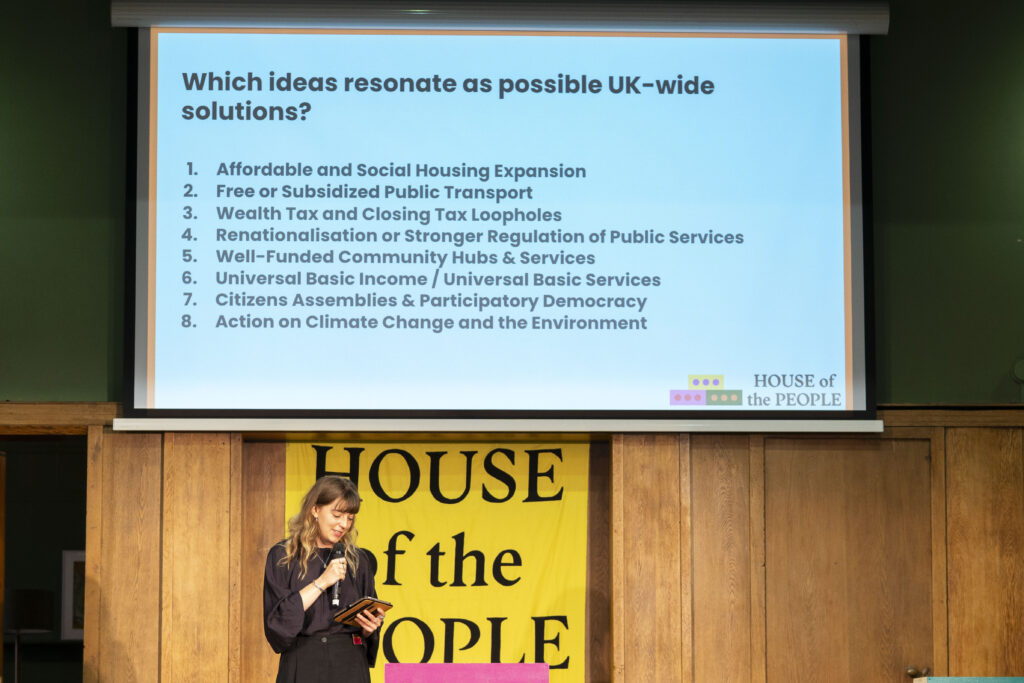
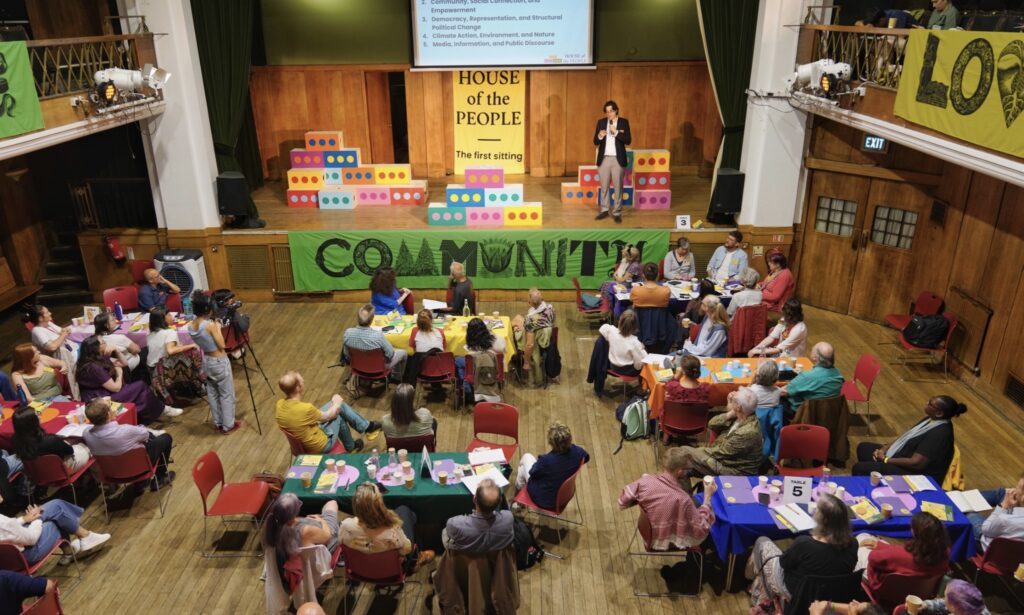
Expert Consultation – day two
Attendees interviewed expert advisors in four working groups to inform their discussions. I attended the Democracy group.
During a break for refreshments and fresh air, Economist Richard Murphy gave an informal but animated seminar on government debt and tax, and back in the assembly, Sarah Chayes spoke passionately about systemic corruption that she described as “Kleptocracy”, a word that seemed to gain mainstream acceptance as everyone seemed to use the word following the talk.
In this session I argued that Direct Democracy (Citizens Assemblies) should be put to the top of our list following a suggestion by my neighbour that if we’re too radical we’ll get pilloried in the press, I suggested that we would with modest measures so let’s be radical and suggest that Assemblies become the government.
In the afternoon the four groups developed twelve proposals each which were presented and thoroughly examined the following morning in a rigorous question and answer session.
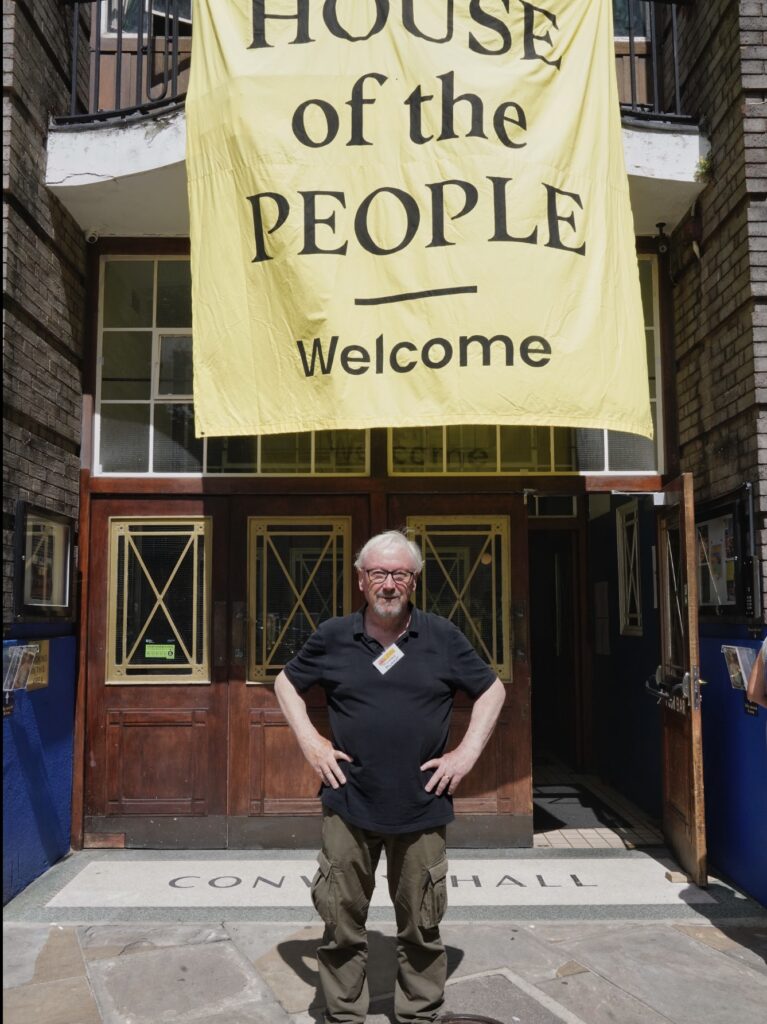
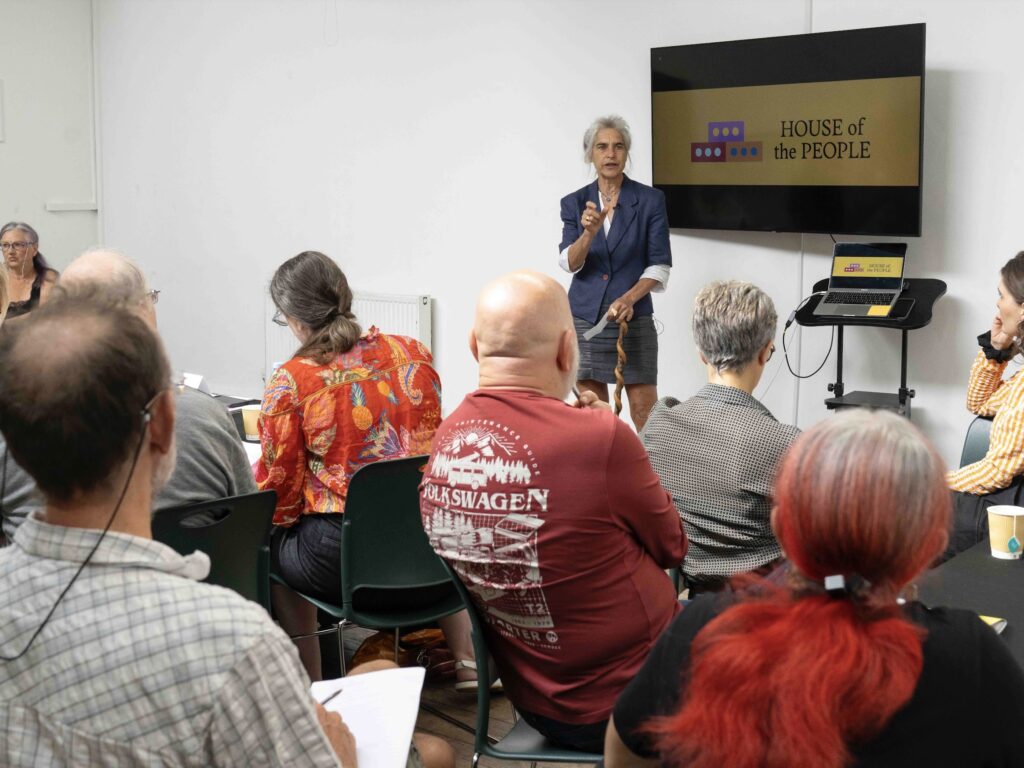
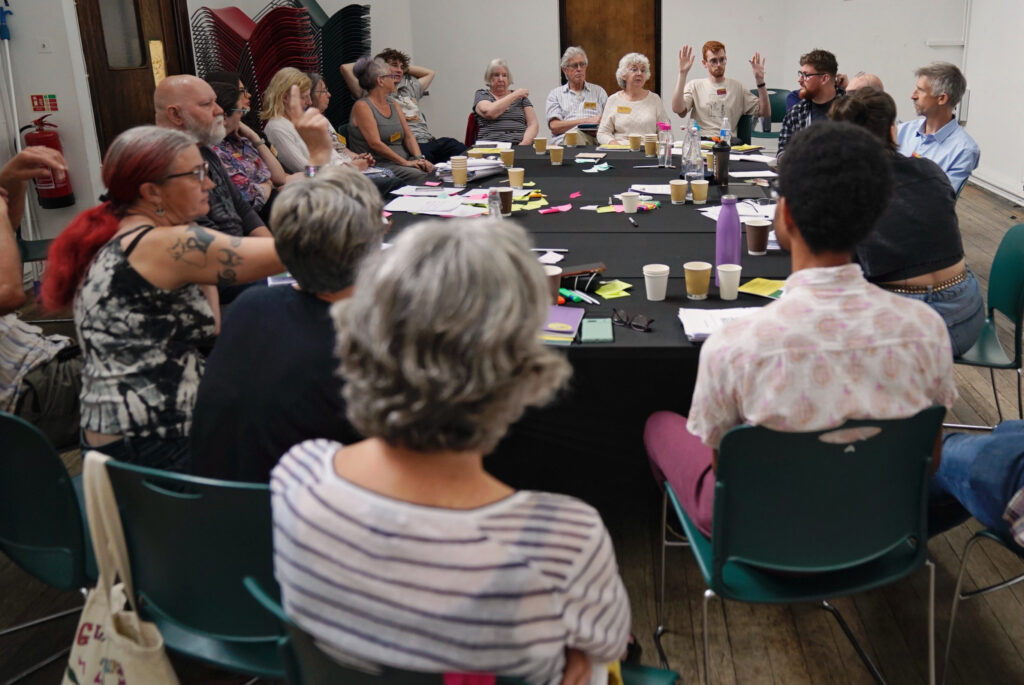
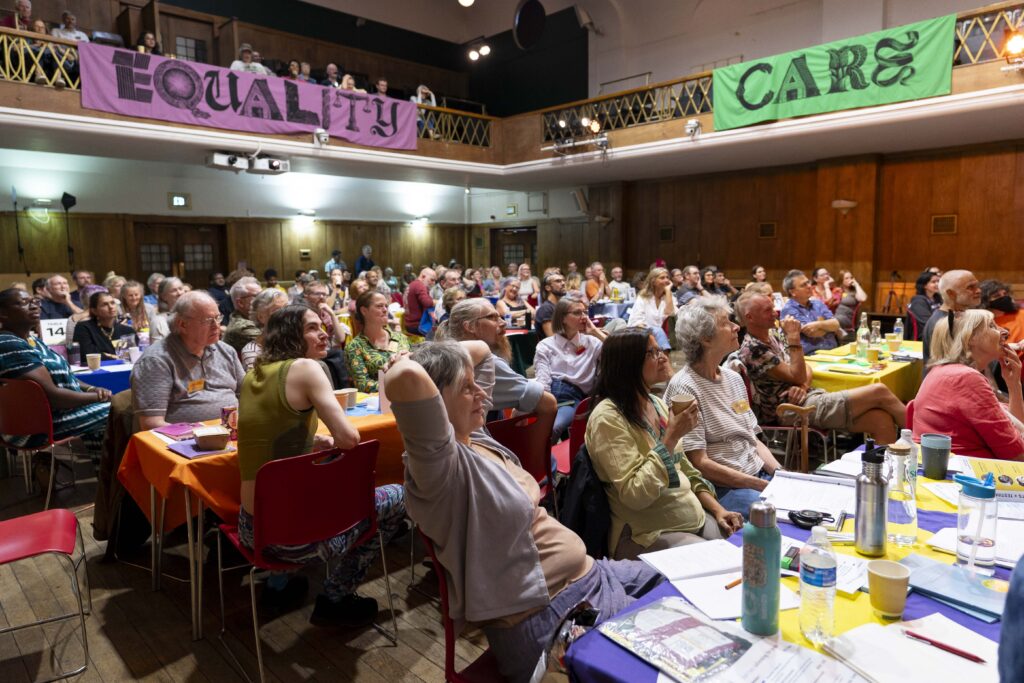
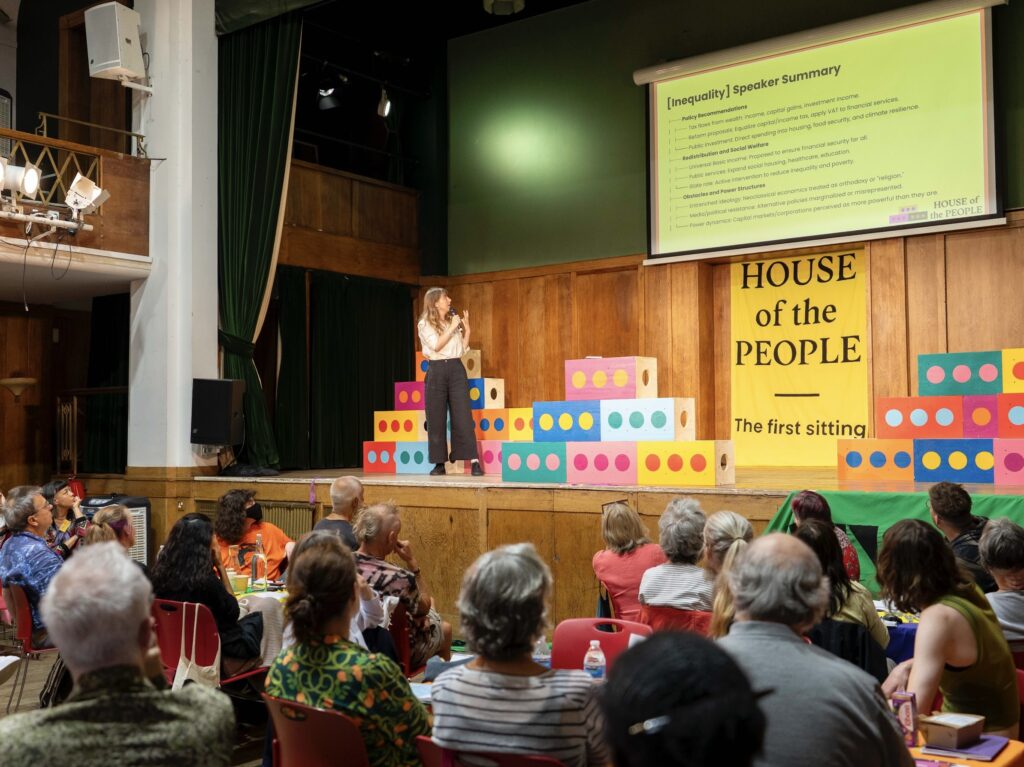
Deliberation and Voting day 3
The House of the People had spent a significant amount of time and effort dedicated to discussing many critical issues. We had focused on “hearing, amplifying, and connecting the voices of people,”bringing to the surface urgent problems and potential solutions”, often revealing deep frustration with the status quo and a shared hope for a fairer, democratic future. Dominant themes included the following:
Economic and Social Equality
There was a strong consensus that the current economic model exacerbates inequality. Proposals included wealth taxes, closing tax loopholes, nationalizing key industries, universal basic income (UBI), and universal basic services (UBS).
Political Disillusionment
Participants expressed widespread cynicism about MPs, lobbying, and corporate capture, calling for improved transparency, accountability, and participatory democracy. I suspect that this priority was at least in part determined by the presentation by Sarah Chayes on “kleptocracy“.
Environmental Action
Climate action was deemed non-negotiable and interconnected with social and economic policy. Calls were made for transitioning away from GDP-based growth models, enshrining rights for nature, and enacting ecocide laws.
Housing and Infrastructure
Affordable and social housing was a top priority, alongside calls for renationalizing bus, rail, and utility services due to critiques of privatization.
Media and Information
Concerns about media bias, corporate ownership, and misinformation led to suggestions for stricter regulation and independent, publicly funded media.
International Issues
Discussions touched on immigration, calling for better public information and fair asylum processes, as well as proposals for global accountability, such as reparations for colonialism and demilitarisation.
In the afternoon it was now time for voting.
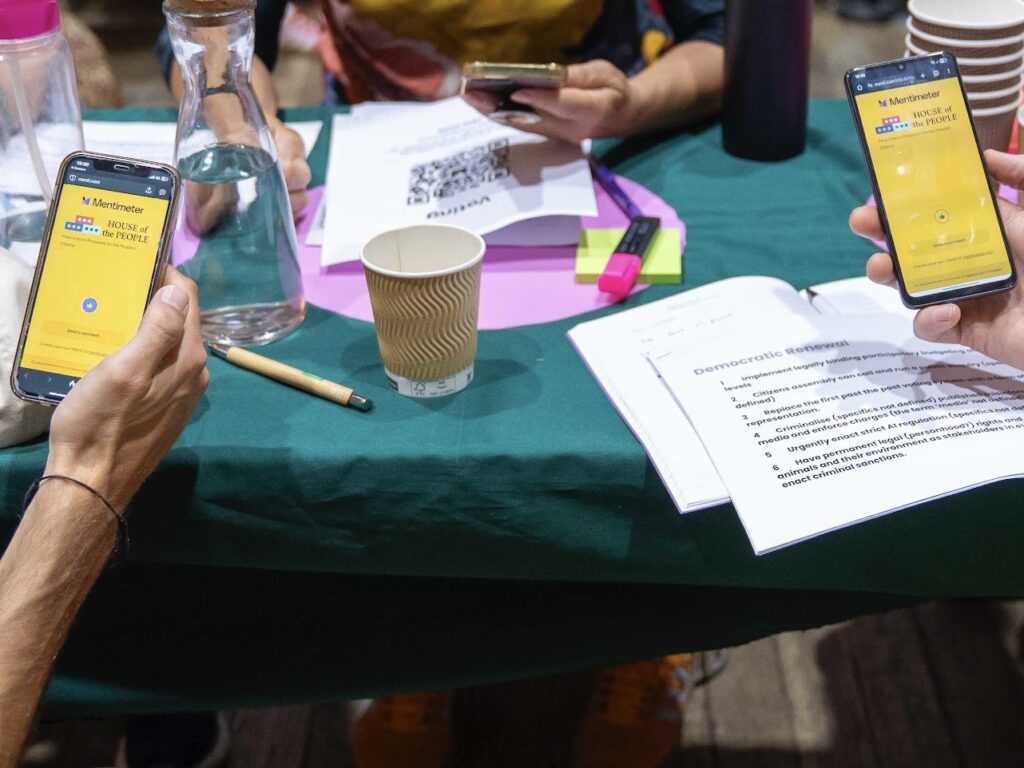
The People’s Charter: Top 5 Priorities
After intensive deliberation and voting, the House of the People produced the People’s Charter, outlining five top priorities for political action:
- Tax Wealth: This includes removing tax loopholes and tax havens, ending pension tax subsidies for high earners, charging National Insurance equivalent on investment income over £5,000 annually, and applying VAT to banking services
- Strengthen Anti-Corruption Laws: Prohibiting lobbying, gifting, and second jobs in politics
- Future Generation Act: Implementing a first principle act that prioritizes well-being, sustainability, and nature over GDP for all current and future generations
- Immediate Total Embargo on Arms, Trade, and Support: For all countries violating international law, with immediate priority given to Israel
- Long-Term Decommodification of Housing: Ensuring renters’ rights, councils repurchasing disused, empty, or holiday homes for repurposing and building green council housing, enshrining structural laws without loopholes, and implementing rent increase caps
Beyond these top five, other significant proposals included a legal constitution granting people the power to decide on war, guaranteed basic income, capital controls, and strict AI regulation.
The Path Forward: Building a Mass Movement
The House of the People is described as “only the first step” in a larger movement. The goal is to build a mass movement to make these proposals a reality and “permanently change the system so that WE decide how our country is run”. The movement is crowdfunded, not corporate, thus Independant.
Democracy in its current form is not so much broken as not fully implemented and so was always going to be corrupted by other power structures. I believe that democracy must continue to be developed so that every institution and organisation is a house of the people.
This vision seems to align with the organisers broader aim: to demonstrate a scalable model for a fairer, more participatory, and representative democracy, proving that the UK public knows better than “Lords, lobbyists, and career politicians”. A second sitting of the House of the People is already planned for February 2026.
Just as a healthy ecosystem requires diverse elements to thrive and self-regulate, a true democracy, as envisioned by the House of the People, needs the constant, direct engagement of its diverse citizenry to prevent corruption and ensure it serves the well-being of all, not just a select few.
Fundraising links
https://www.chuffed.org/project/assemble
https://www.houseofthepeople.uk/donate
Web address
https://www.houseofthepeople.uk
John A Smith
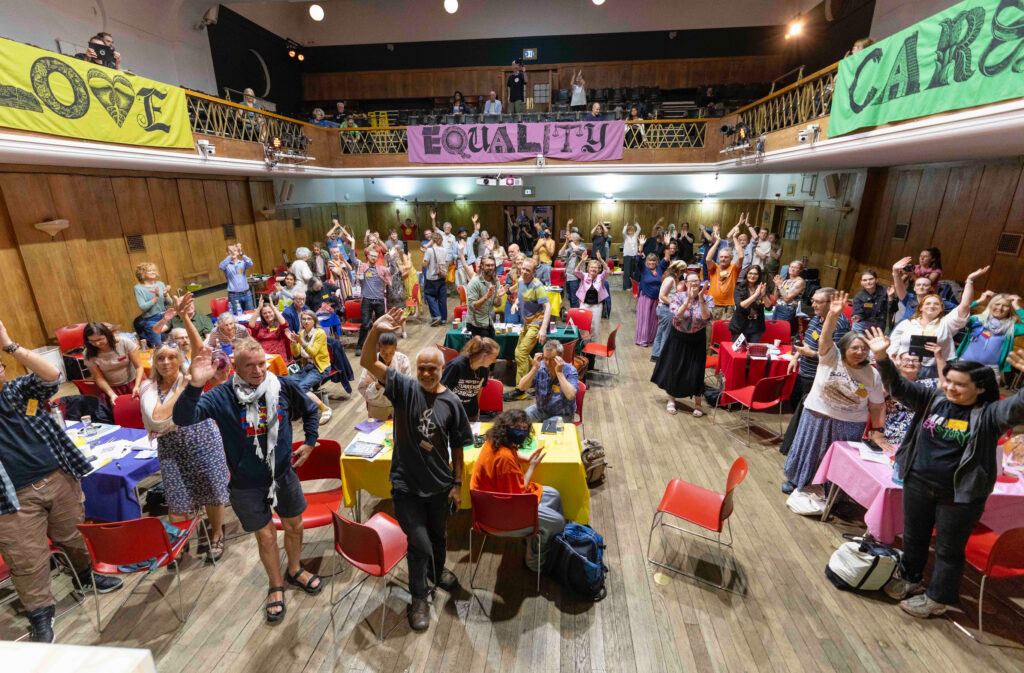
Related Posts
-
Peoples Assembly launch
Comedian Mark Steel talks about the People’s Assembly launch in London The People’s Assembly – a new initiative backed by major trade unions including Unite, Unison, NUT, PCS, TSSA; the Green Party, Labour MPs, Coalition…
-
Assemblies for Democracy ‘must develop teeth’
For many years I’ve been a non-voter – they think they can run things better than the population. I don’t agree – the system rules regardless of who is in Parliament. Therefore I’m not represented…
-
Peoples Assembly Huddersfield
Huddersfield Rises: Local Voices Demanding National Climate Actionand Democratic Reform! It’s inspiring to be part of a surge of grassroots energy transforming a local community into a potential powerhouse of change. This spirit of change…
-
Democracy Mandate
My experiences at the House of the People The House of the People, a groundbreaking grassroots initiative, convened its first national democratic assembly in London, bringing together a diverse group of citizens to shape the…

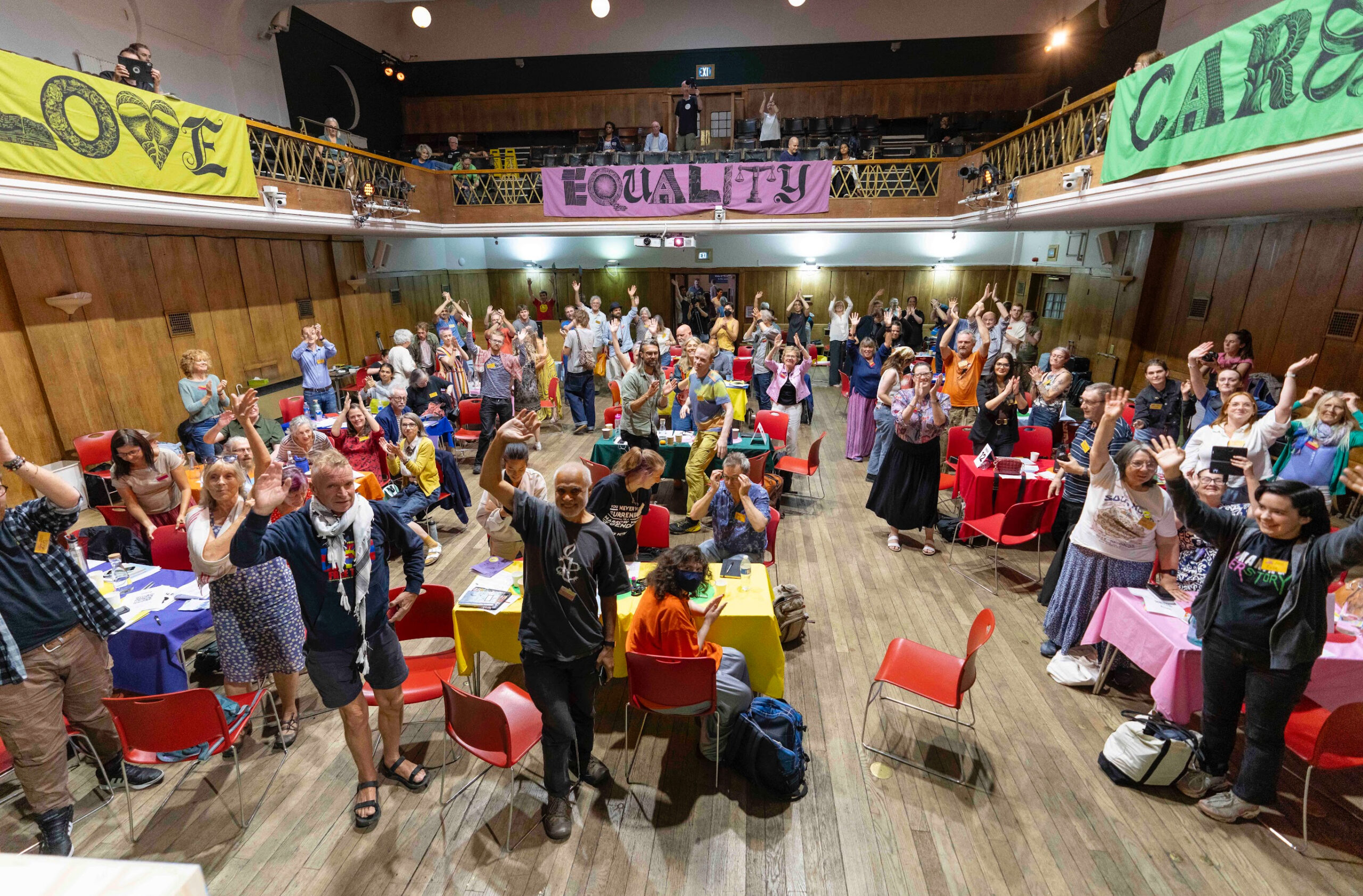

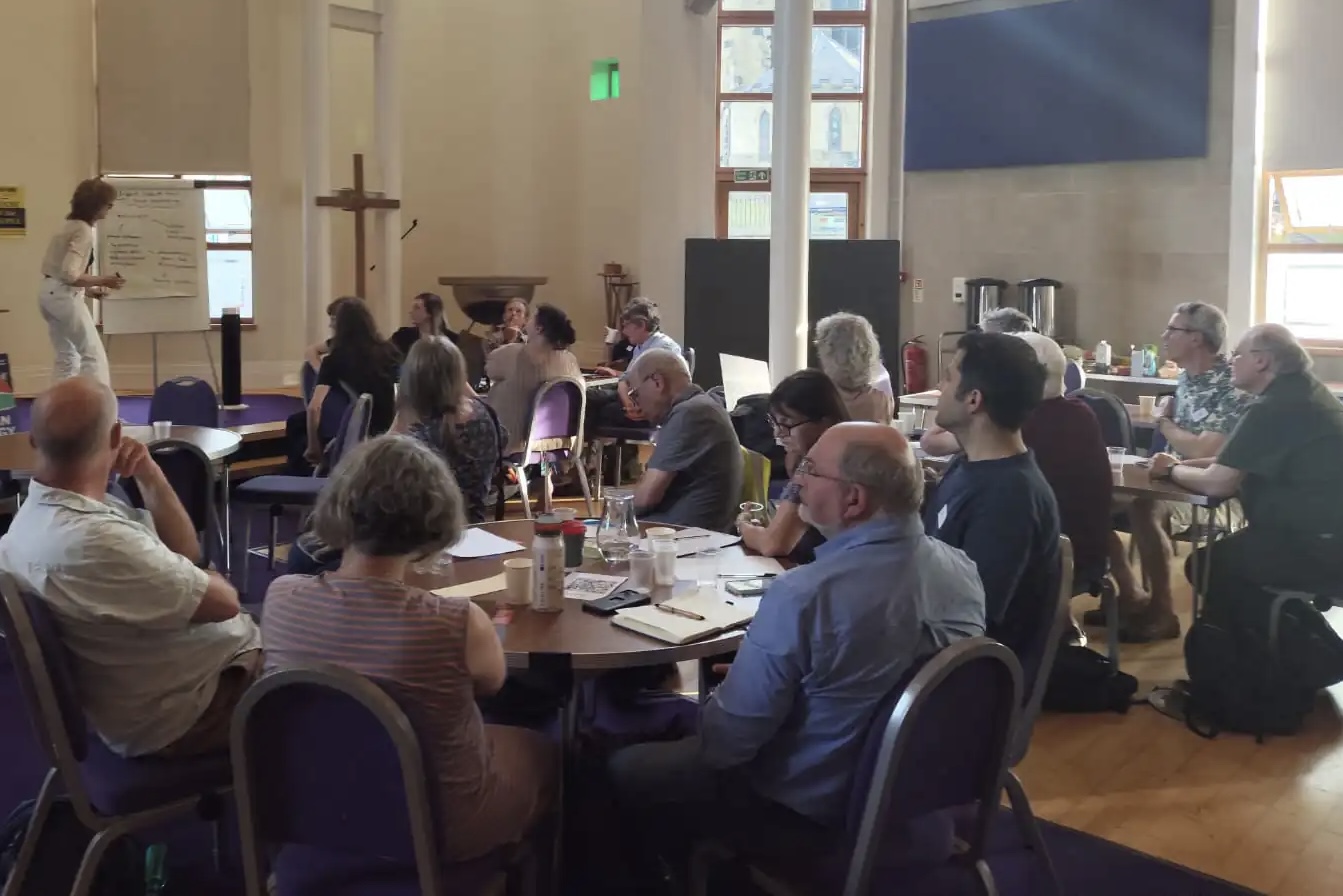
Leave a Reply